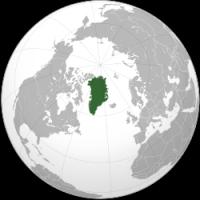|
|
|
Greenland ( meaning "Land of the Greenlanders"; ) is an autonomous country within the Kingdom of Denmark, located between the Arctic and Atlantic Oceans, east of the Canadian Arctic Archipelago. Though physiographically a part of the continent of North America, Greenland has been politically and culturally associated with Europe (specifically Norway and Denmark) for about a millennium. The largest island in Greenland is also named Greenland, and makes up most of the country's land area. Greenland has been inhabited, though not continuously, by Inuit peoples via Canada for 4500-5000 years. In the 10th century, Norsemen settled on the uninhabited southern part of Greenland. In the 13th century, the Inuit arrived, and in the late 15th century the Norse colonies were abandoned. In the early 18th century contact between Scandinavia and Greenland was re-established and Denmark established rule over Greenland. Greenland became a Danish colony in 1814 after being under the rule of Denmark-Norway for centuries. With the Constitution of Denmark of 1953, Greenland became a part of the Kingdom of Denmark in a relationship known in Danish as Rigsfællesskabet (Commonwealth of the Realm). In 1979 Denmark granted home rule to Greenland, and in 2008 Greenland voted to transfer more power from the Danish royal government to the local Greenlandic government. This became effective the following year, with the Danish royal government in charge of foreign affairs, security (defence-police-justice), and financial policy, and providing a subsidy of DKK 3.4 billion, or approximately $11,300 per Greenlander, annually. Greenland is, by area, the world's largest island that is not a continent. With a population of 56,615 (January 2011 estimate) it is one of the least densely populated dependencies or countries in the world. |




 RSS
RSS